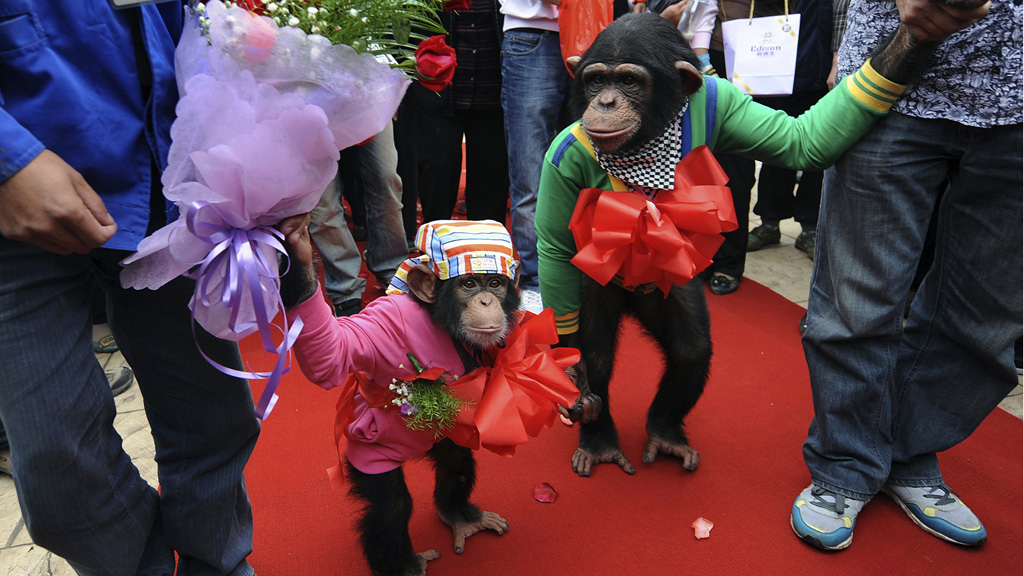Chinese prosperity’s hidden threat to African apes
Extraction of Guinea’s mineral wealth by China is being used as a smokescreen for the trafficking of great apes, say conservationists. Asha Tanna reports on the latest threat to African wildlife.

As China continues to push its economic development, precious resources in some of the most remote corners of the west African nation of Guinea are being pumped out of the country to aid China’s growth as the new super power.
But while there are legitimate contracts for mining bauxite for aluminium, iron reserves, gold and cobalt, the large presence of Chinese miners in the area has also created an underground network of traffickers pushing the illegal trade in live chimpanzees and in some cases gorillas.
Wildlife experts meeting in Paris for a three-day conference at the Unesco headquarters said on Tuesday that in the last two years the number of great apes smuggled out of Guinea for use in Chinese zoos is estimated to be at least 138.
Conservationists attending the conference have said that this illegal trade must be stopped now if these species are to have any hope of long-term survival in the wild.
Slow reproductive rates
The numbers are shocking especially when put into context that for every infant chimpanzee taken at least ten members of its family group have died trying to protect it.
Chimpanzees have slow reproductive rates their populations are unlikely to bounce back if they suffer large losses to their numbers. Present estimates put the number of wild chimpanzees in Africa at around 200,000. In west Africa the greatest number is thought to be in Guinea.
According to the Pan African Sanctuary Alliance, a non governmental organisation campaigning for primate welfare, infant chimpanzees imported from Guinea have been put on display at two Chinese zoos since 2010 – the Jinan Zoo (Shandong Province) and the Hefei Wildlife Park (Anhui Province).
For some species, it is quite literally their last hope, John Scanlon
Great apes, such as chimpanzees and gorillas, are protected under international law. It is illegal to transfer wild-caught specimens out of Africa.
There are no captive breeding facilities and no zoos in Guinea or in neighbouring countries such as Sierra Leone, Cote d’Ivoire, or Guinea Bissau. Scientists who are monitoring the situation in Guinea say the apes being smuggled out are being ordered specifically for zoos in China.
Doug Cress, the UN’s Great Ape Survival Project Co-ordinator, who is attending the Paris conference, told Channel 4 News: “It’s not just about protecting a species or a habitat anymore. The world has gotten much more complex, and we need to take into account numerous human issues if great apes are to survive.
‘No questions asked’
“Daily flights from Conakry to China have been running since mining started. Chimpanzees are being caught, stuffed into crates and packed onto a flight with no questions asked.
“Each one costs around $25,000, with gorillas brought into Guinea and shipped off selling for around $40,000 each. Current export controls at the airport are unsatisfactory and we believe corruption and gross incompetence by officials are allowing this trade to thrive.”
Scientists meeting at today’s conference are expected to discuss strategies to try to mitigate the problem which has raised grave concern among primatologists.
Professor Richard Wrangham, who splits his time between the Kibale Chimpanzee Project in Uganda and the Department of Human Evolutionary Biology at Harvard University, said: “We have to get it right for great ape conservation, and we have to get it right now. We need a renewed commitment to conservation that not only halts those declines, but actually begins to reverse those trends.”
The new logging
Mr Cress says mining and its impacts on primate habitat is such a serious threat it’s being described as the new logging.
“The Chinese are bringing their own labourers into remote areas and wildlife trafficking is a lucrative illegal trade. Law enforcement for wildlife is non existent in Guinea. It’s likely that permits have been falsified or stolen for shipments to pass through.”
According to Interpol, global environmental crime is believed to be “serious, trans-national and organised”. Last month China hosted its first National Environmental Security Seminar in Beijing with the support of the international police organisation, Interpol.
China pledged to develop opportunities to enhance its environmental record, but in March this year Interpol published statistics on global environmental crime which showed China had illegally exported 69 chimpanzees from Guinea in 2010, and at least 130 had been taken in the past three years.
John Scanlon, the secretary-general of the Convention on International Trade in Endangered Species of Wild Fauna and Flora (CITES), is expected to deliver a keynote address at Tuesday’s session in Paris. “For some species, it is quite literally their last hope, if they are not to disappear from the face of our planet,” he said.
“Every time a protected species is poached, every time a skin is smuggled across a border, every time a body part or product enters an illicit market, the conservation community has failed, and we are one step closer to the extinction of that animal in the wild.”
Doug Cress has called for action to stamp out this illegal trafficking. “It seems hardly credible that no one has been suspicious of the shipments of such high-profile endangered species. We are calling on CITES to investigate.
“If, as expected, the transfers are illegal or the transfers used forged documents, we need CITIES to direct the authorities in China to confiscate these animals and return them to their country of origin.”
Asha Tanna is Channel 4 News science reporter, and has a masters in primatology